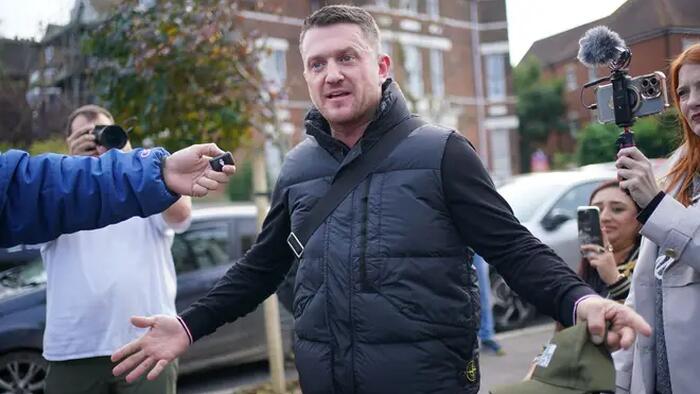Tommy Robinson, a controversial UK activist known for his far-right views and activism, has been sentenced to 18 months in prison after admitting to contempt of court. The 41-year-old, whose real name is Stephen Yaxley-Lennon, breached a 2021 High Court injunction that prohibited him from making defamatory statements about Syrian refugee Jamal Hijazi. Robinson’s legal troubles stem from a previous libel suit in which Hijazi successfully sued him for £100,000 (about $129,000) in damages for false statements made in relation to surges of violence in schools attended by Hijazi. In addition to his contempt of court charge, Robinson faces further legal actions after police detained him for failing to provide the PIN code for his mobile phone during a stop under the Terrorism Act at the Channel Tunnel.
In court, Robinson laid out his defense, passionately asserting his belief in freedom of speech and the press. He framed his actions as journalistic endeavors to unveil the truth about serious societal challenges, claiming that the allegations he repeated were factual rather than defamatory. He insisted that his film “Silenced,” which was intended to detail the testimonies of witnesses supporting his case, should have been allowed to be shown without repercussions. Robinson maintained that he did not make baseless accusations, claiming that he reported what was conveyed to him by credible witnesses, including the head teacher of the school involved in the case, while noting Jamal’s strong denial of the allegations presented against him.
Robinson expressed outrage that the court and media disregarded the testimonies of children who advocated for him in court. He accused Justice Nicklin of dismissing their evidence without sufficient justification and suggested that the judge’s ruling had far-reaching consequences. He claimed the verdict had detrimental effects on the lives of those who testified, citing mental health struggles faced by some of them after the case. His arguments emphasized the need for a more transparent disclosure of information, arguing that the public deserved insight into truths obscured by legal restrictions and biased media reporting.
The case against Robinson is emblematic of a broader cultural clash in the UK, where debates around free speech and public safety often collide. In an era marked by increased sensitivity to hate speech and the ramifications of incendiary rhetoric, Robinson’s situation raises questions about the limits of journalistic freedom. While he frames his actions as a pursuit of truth, critics argue that his rhetoric incites division and violence, exacerbating societal tensions. The context of his previous legal troubles, including his earlier imprisonment for contempt, paints a picture of an individual frequently in conflict with the law while claiming to uphold a righteous political agenda.
Following his arrest, protests were organized in support of Robinson, with significant gatherings in London showcasing the divided public sentiments surrounding him. His supporters, numbering around 200,000 according to reports, gathered to rally against what they viewed as governmental overreach and suppression of free speech. Meanwhile, Robinson’s detractors see his influence as detrimental to social cohesion and a catalyst for significant unrest in society. This polarized response illustrates the pervasive and often contentious debates over free speech and its consequences in modern Britain.
As he begins his 18-month sentence, Robinson’s defiance of the court’s ruling, and his insistence on his rights as a journalist, highlight ongoing tensions surrounding free speech, civil liberties, and the judicial system. The implications of his case reach beyond personal consequences, resonating within broader discussions about the responsibilities tied to free expression, accountability in journalism, and the protection of marginalized communities from harmful narratives. Whether Robinson’s imprisonment will serve as a deterrent against similar acts of contempt, or embolden his supporters, remains to be seen as the legal proceedings surrounding him continue to unfold in a highly charged political landscape.

